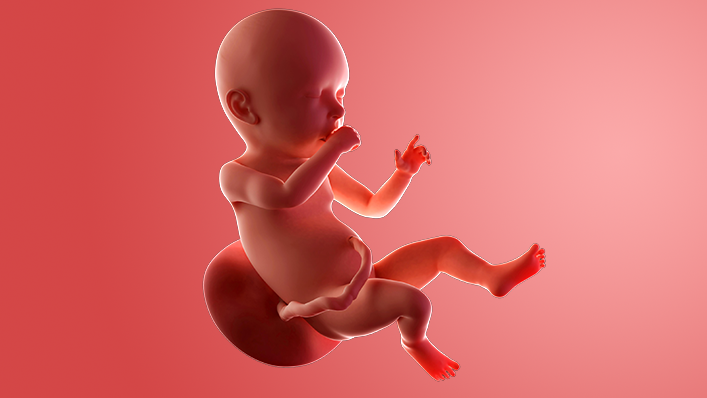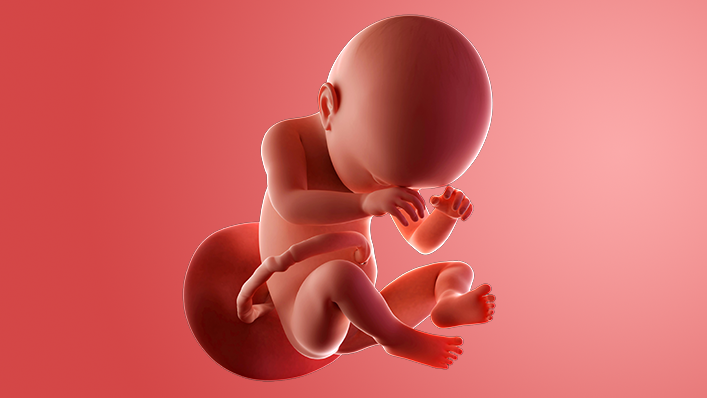What's happening in my body?
You might be getting a lot more discharge in your pants than usual. This should be thin, white and not smell of very much.
If you spot a slimy blob of mucus that's yellow or bloody, then that's called a "show". This sticky stuff used to plug up your cervix and when it comes out, it can be one of the first signs that your baby's on the way.
However, don't grab your hospital bag just yet, as you could still have days to wait.
You may be getting back pain as your baby moves down your pelvis and starts pressing against your spine. You'll probably feel increased pressure at the bottom of your bump now.
You could also be getting sudden bursts of energy and urgently want to fold baby clothes or tidy drawers that you haven't opened for years. That's your nesting instinct kicking in.
RSV vaccination
Have you had the RSV (respiratory syncytial virus) vaccine? It's usually offered at around week 28 but can be given later if needed, right up until you go into labour.
Having the vaccination can lower your baby's risk of a severe lung infection called bronchiolitis, which can make it difficult for your baby to breathe and feed. If you've not had it yet, speak to your midwife or a GP.
9 signs you should not ignore
If you get any of the following signs, then treat it as an emergency and call your midwife, doctor or NHS 111:
- bleeding from your vagina
- brown or pink discharge
- severe itching, particularly at night
- a terrible headache that will not go away
- vision problems (blurring, light sensitivity, seeing spots or flashing lights)
- pain just below the ribs
- extreme swelling of the feet, ankles, hands and face
- persistent stomach pains
- a high temperature (above 37.5 degrees C) with no other flu or cold symptoms
7 things you might not expect when your baby is born
- Babies do not usually come out wailing like they do in the films. It could take a few seconds before they cry or splutter to clear their airways.
- Your baby will be checked out within a minute of being born. You might not be aware of it, as you'll be meeting your baby at the same time. Your baby will be rated on the Apgar scale for their heart rate, breathing, muscle tone, responsiveness and skin colour. This will be rechecked at 5 minutes.
- Your baby's hands and feet might be blue, as their circulation is still a work in progress. The rest of their skin will be dark red or purple, then turn a brighter red when they take their first breath. It can take weeks before their true skin colour is revealed. If your baby's rubbed vigorously with a towel, this doesn't mean that there's a problem, it's probably just to help the blood flow.
- It can take a few minutes before your baby is breathing regularly. They tend to do lots of fast breaths, then lots of slow breaths. The gap between breaths can be as long as 5 seconds. They're just learning to breathe, so this is normal.
- Boys can be born with large testicles – that's just temporary, caused by hormones and water retention. They will settle down and look more in proportion soon.
- It's not always love at first sight. Give yourself time to bond with your baby and ask for help if you need it.
- It can take 6 weeks for your womb to go back to the size it was. Breastfeeding can speed this process up, as it makes your womb contract. Find out more on the NHS website about your body after the birth and what happens when your baby is born.
3rd trimester pregnancy symptoms (at 39 weeks)
You could be getting a lot of practice contractions, but if they start getting painful, then they could be the real deal. Read 5 signs that baby's on the way on week 37's page.
Phone your hospital or midwife when your contractions last for at least 60 seconds and come every 5 minutes – or call any time if you're worried that something is wrong, such as if your baby stops moving or if you're losing blood.
Your signs of pregnancy could also include:
- painless contractions around your bump, known as Braxton Hicks contractions
- sleeping problems (week 19 has information on feeling tired)
- stretch marks (week 17 has information on stretch marks)
- swollen and bleeding gums (week 13 has information on gum health during pregnancy)
- pains on the side of your baby bump, caused by your expanding womb ("round ligament pains")
- piles (week 22 has information on piles)
- headaches (read about headaches in pregnancy on NHS.uk)
- backache
- indigestion and heartburn (week 25 has information on digestive problems)
- bloating and constipation (week 10 has information on bloating)
- leg cramps (week 20 has information on how to deal with cramp)
- feeling hot
- dizziness
- swollen hands and feet
- urine infections
- vaginal infections (week 15 has information on vaginal health)
- darkened skin on your face or brown patches – this is known as chloasma or the "mask of pregnancy"
- greasier, spotty skin
- thicker and shinier hair
You may also experience symptoms from earlier weeks, such as:
- mood swings (week 8 has information on mood swings)
- morning sickness (week 6 has information on dealing with morning sickness)
- weird pregnancy cravings (week 5 has information on pregnancy cravings)
- a heightened sense of smell
- sore or leaky breasts (week 14 has information on breast pain) – a white milky pregnancy discharge from your vagina and light spotting (seek medical advice for any bleeding)
What does my baby look like?
Your baby, or foetus, is around 50.7cm long from head to heel. That's approximately the size of a watermelon.
A few weeks ago, your baby's skin was almost transparent but now they're growing a tougher new layer that looks more solid. This is better at protecting their internal organs and helping with temperature control.
The skin will be coated in a white, waxy substance called "vernix", which means varnish in Latin. This creamy layer helps to protect their skin and eases your baby down the birth canal.
Your baby might be covered in it when they are born, or it could be mostly gone.
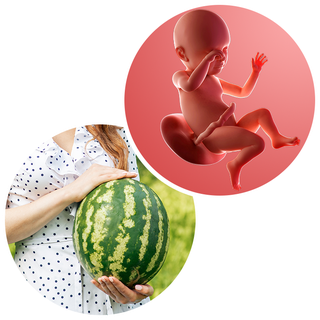
Action stations
Be on full alert in case your waters break, as this could happen at any time. Don't expect a tidal wave, as it could be just a trickle.
If you think it's started, then call your midwife or doctor and ask for advice.
You might have just wet yourself, but if your waters have broken, then your labour may need to be induced, as your baby will be at a greater risk of infection.
This week you could also...
This week's treat
Spend some time in nature. Go and kick leaves in the park, walk in the woods, water your garden or plant some seeds (use gloves to avoid the risk of infection).
This is good exercise and will encourage your brain to release feel-good chemicals.
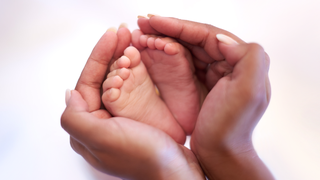
Baby basics
From the essentials of caring for your baby to understanding their sleep, find out all the baby basics you need to know about your newborn.
More in week-by-week
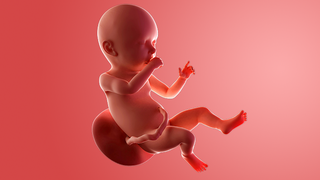
Week 40
The wait is nearly over. Within days, you'll get to meet your baby. It's been quite a journey, but the real adventure starts when your little one is born.
More in week-by-week guide to pregnancy
